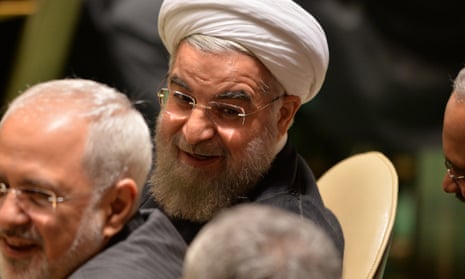The United States did not invite Iran to Tuesday’s UN summit on combating Islamic State and other violent extremist groups because it still designates Iran itself as a state sponsor of terrorism.
Even if he had been invited, it is not clear if Iranian President Hassan Rouhani would have taken part. He has made clear he has different views to the Obama administration on fighting Isis, and he will cut short his attendance at this week’s UN summit, leaving for Tehran after making his speech to the general assembly on Monday morning to lead mourning for the more than 150 Iranian victims of the Hajj stampede in Mecca.
However, the absence of an invitation to a critical meeting on violent extremist groups in Syria and Iraq, an issue in which Iran has a major stake, illustrates the remaining institutional and political barriers to US cooperation with Iran even after the successful negotiation of an agreement on its nuclear programme in July.
US State Department officials confirmed that Iran’s designation as a state sponsor of terrorism was the reason for its exclusion from the countering Isis summit being chaired by Obama on Tuesday.
Iran was first designated a state sponsor of terrorism by the State Department in 1984 and the designation has been rolled over each year. The latest State Department report said: “Iran continued its terrorist-related activity in 2014, including support for Palestinian terrorist groups in Gaza, Lebanese Hezbollah, and various groups in Iraq and throughout the Middle East.”
The US also accused Iran of increasing assistance to Iraqi Shia militias, one of which was designated a terrorist organisation, “in response to the Islamic State in Iraq and the Levant incursion into Iraq, and has continued to support other militia groups in the region”. Iranian officials have complained that about being stigmatised by backing militia groups fighting Isis, something the US is also attempting to do.
The state sponsor of terrorism label does not present a legal barrier to negotiating with a national government, a fact that allowed the nuclear negotiations to take place, so there is an element of discretion in its application.
“These labels and lists reduce American manoeuvrability and flexibility at a time when agility is a critical property in foreign policy,” said Trita Parsi, the head of the National Iranian-American Council, an advocacy group promoting diplomacy with Iran. “For Iran, some of these things become a litmus test for American sincerity. It may or may not have been interested in taking part but it is enormously insulted not to be invited.”
Ilan Goldenberg, a former senior State Department official who is now Middle East director at the Center for a New American Security thinktank, said that the invocation of the state sponsor status was largely a matter of discretion and covered a host of underlying political problems.
“Politically, it is too soon for both sides,” Goldenberg said. “We still have the Arabs to manage. If we invite in the Iranians we anger the Saudis and the other Gulf states. And for political reasons, too, since the nuclear deal, the administration has tacked to the right.” He added that in Iran, the Sspreme leader, Ali Khamenei, had declared himself opposed to greater engagement with Iran beyond the nuclear deal.
Speaking to Iran policy analysts in New York on Sunday, Rouhani indicated his views on combating Isis were closer to Russians than to the West, insisting that priority be given to fighting the extremist group first without weakening the Assad regime in Damascus. Only after that, he said, should reform in Damascus be addressed.

Comments (…)
Sign in or create your Guardian account to join the discussion